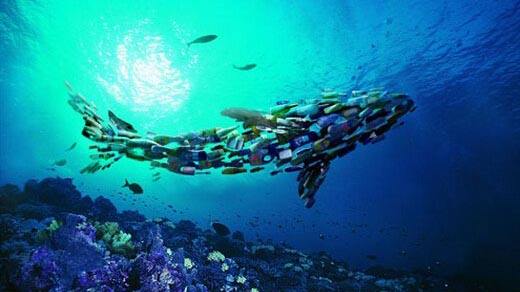
A scientist has filmed the moment plastic microfibre is ingested by plankton, illustrating how the material is affecting life beneath the waves.
一位科学家拍到了浮游生物吞食塑料微细纤维的画面,说明塑料如何影响海洋里的生物。
The footage shows one way that waste plastic could be entering the marine and global food chain.
这则录像显示了塑料废物进入海洋和全球食物链的一种方式。
An estimated 150 million tonnes of plastic "disappears" from the world's waste stream each year.
据估计,每年有1.5亿吨塑料从被污染的流域“消失”。
Waste plastic in the world's seas has been recognised by the United Nations as a major environmental problem.
联合国将海洋废弃塑料看作是一个重大的环境问题。
"When I saw it, I thought that here was something, visually, to convey to the public the problem of plastic in the sea," said Richard Kirby, who recorded the footage.
视频的录制者理查德•科比称,“当我看到这段时,我认为它从视觉上让公众了解了海洋塑料的问题。”
"What intrigues me is that because the fibre has made a loop inside the animal's gut, you can actually see the consequences of something as small as the arrow worm consuming microplastic.
“让我感兴趣的是,塑料纤维在箭虫的腹中结成环状,你可以看到和箭虫一样大小的生物摄入了微细塑料后的结果。”
Dr Kirby said that people were familiar with the idea of large marine animals - such as whales, seals and birds - swallowing plastic bags.
科比说,人们对鲸、海豹和海鸟等海洋生物吞食塑料袋的情况比较熟悉。
"But here we have something where we actually see that at a tiny fibre has caused a blockage in something as small as a Sagitta setosa, a member of the plankton, stopping food progressing down.
“但我们在视频中看到细微的塑料纤维堵在浮游生物体内,使食物无法通过消化道。”
The United Nations has estimated that there are 46,000 pieces of waste plastic per square mile of sea.
据联合国估计,每平方英里海域有46000块塑料碎片。
The issue of plastic waste in the marine environment has been rising up the political and policy agenda.
海洋环境的塑料污染问题已经提上政治和政策议程。
The international body's environment agency, UNEP, has launched a #CleanSeas campaign.
联合国环境机构联合国环境规划署已经发起一场#清洁海洋运动。
The organisation's head, Erik Solheim, said: "We've stood by too long as the problem has gotten worse. It must stop. "
联合国环境规划署负责人埃里克•索尔海姆说,“问题越来越严重,而我们已经等待太久。这种情况必须停止。”
The UN estimated that as many as 51 trillion (500 times as many stars estimated to be in our galaxy) particles of microplastic are in the world's seas and oceans.
据联合国估计,全球海洋中大约有51万亿个塑料微粒,是银河系中恒星数量的500倍。
The widespread presence of plastic in our waters meant that it was a problem for arrow worms, said Emily Baxter, senior marine conservation officer for the North West Wildlife Trusts.
英国西北野生动物基金会的资深水生动物保护负责人艾米丽•巴克斯特说,海水中存在的大量塑料对箭虫是个大麻烦。
"They play a really important ecological role in the marine food web. They are voracious predators of other planktonic animals and also represent an important food source for fish, squid and other things that eat plankton."
“箭虫在海洋食物链中起着非常重要的生态作用,它们吃其他的浮游生物,同时也是鱼类、乌贼和其他生物的重要食物来源。”
"Even if we stopped producing plastic today this problem is going to continue for a long time. We see it now coming into the bottom of the food chain and potentially affecting the food chain all the way up," she said.
“即使我们现在就停止生产塑料,问题仍然会持续很久。我们看到,塑料已经进入生物链底层,可能将影响其上的整条食物链。”
Source:董静 & yaning fromlanguage.chinadaily.com.cn

















